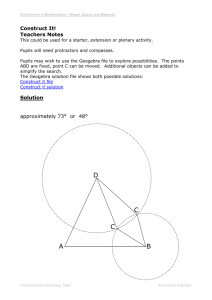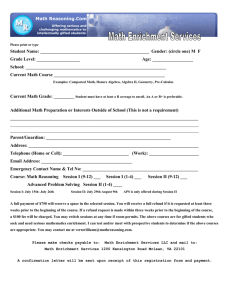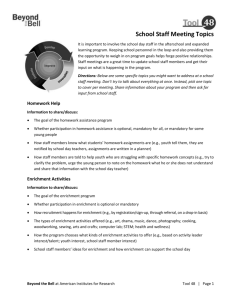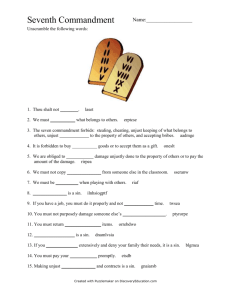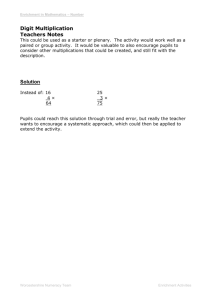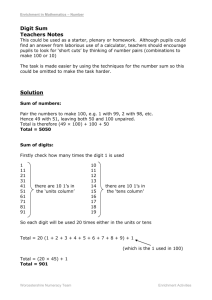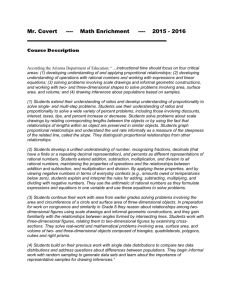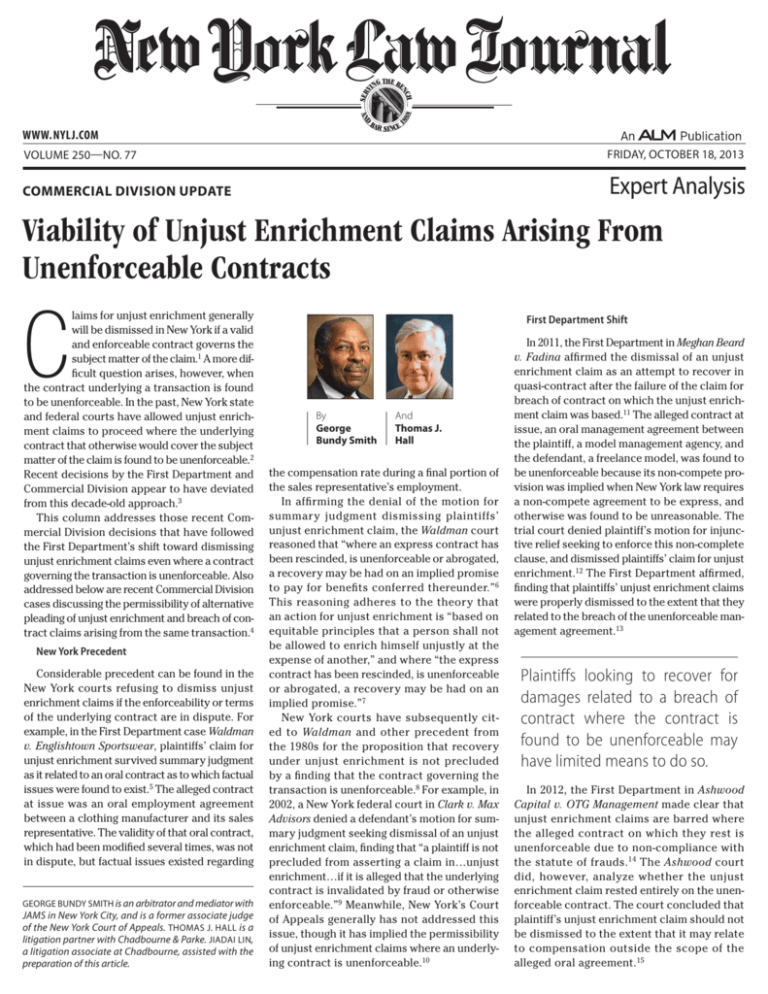
88
8
SER
V
AND
WWW. NYLJ.COM
H
NC
THE BE
ING
1
BA
R SINCE
VOLUME 250—NO. 77
FRIDAY, OCTOBER 18, 2013
COMMERCIAL DIVISION UPDATE
Expert Analysis
Viability of Unjust Enrichment Claims Arising From
Unenforceable Contracts
C
laims for unjust enrichment generally
will be dismissed in New York if a valid
and enforceable contract governs the
subject matter of the claim.1 A more difficult question arises, however, when
the contract underlying a transaction is found
to be unenforceable. In the past, New York state
and federal courts have allowed unjust enrichment claims to proceed where the underlying
contract that otherwise would cover the subject
matter of the claim is found to be unenforceable.2
Recent decisions by the First Department and
Commercial Division appear to have deviated
from this decade-old approach.3
This column addresses those recent Commercial Division decisions that have followed
the First Department’s shift toward dismissing
unjust enrichment claims even where a contract
governing the transaction is unenforceable. Also
addressed below are recent Commercial Division
cases discussing the permissibility of alternative
pleading of unjust enrichment and breach of contract claims arising from the same transaction.4
New York Precedent
Considerable precedent can be found in the
New York courts refusing to dismiss unjust
enrichment claims if the enforceability or terms
of the underlying contract are in dispute. For
example, in the First Department case Waldman
v. Englishtown Sportswear, plaintiffs’ claim for
unjust enrichment survived summary judgment
as it related to an oral contract as to which factual
issues were found to exist.5 The alleged contract
at issue was an oral employment agreement
between a clothing manufacturer and its sales
representative. The validity of that oral contract,
which had been modified several times, was not
in dispute, but factual issues existed regarding
GEORGE BUNDY SMITH is an arbitrator and mediator with
JAMS in New York City, and is a former associate judge
of the New York Court of Appeals. THOMAS J. HALL is a
litigation partner with Chadbourne & Parke. JIADAI LIN,
a litigation associate at Chadbourne, assisted with the
preparation of this article.
First Department Shift
By
George
Bundy Smith
And
Thomas J.
Hall
the compensation rate during a final portion of
the sales representative’s employment.
In affirming the denial of the motion for
summary judgment dismissing plaintiffs’
unjust enrichment claim, the Waldman court
reasoned that “where an express contract has
been rescinded, is unenforceable or abrogated,
a recovery may be had on an implied promise
to pay for benefits conferred thereunder.” 6
This reasoning adheres to the theory that
an action for unjust enrichment is “based on
equitable principles that a person shall not
be allowed to enrich himself unjustly at the
expense of another,” and where “the express
contract has been rescinded, is unenforceable
or abrogated, a recovery may be had on an
implied promise.”7
New York courts have subsequently cited to Waldman and other precedent from
the 1980s for the proposition that recovery
under unjust enrichment is not precluded
by a finding that the contract governing the
transaction is unenforceable.8 For example, in
2002, a New York federal court in Clark v. Max
Advisors denied a defendant’s motion for summary judgment seeking dismissal of an unjust
enrichment claim, finding that “a plaintiff is not
precluded from asserting a claim in…unjust
enrichment…if it is alleged that the underlying
contract is invalidated by fraud or otherwise
enforceable.”9 Meanwhile, New York’s Court
of Appeals generally has not addressed this
issue, though it has implied the permissibility
of unjust enrichment claims where an underlying contract is unenforceable.10
In 2011, the First Department in Meghan Beard
v. Fadina affirmed the dismissal of an unjust
enrichment claim as an attempt to recover in
quasi-contract after the failure of the claim for
breach of contract on which the unjust enrichment claim was based.11 The alleged contract at
issue, an oral management agreement between
the plaintiff, a model management agency, and
the defendant, a freelance model, was found to
be unenforceable because its non-compete provision was implied when New York law requires
a non-compete agreement to be express, and
otherwise was found to be unreasonable. The
trial court denied plaintiff’s motion for injunctive relief seeking to enforce this non-complete
clause, and dismissed plaintiffs’ claim for unjust
enrichment.12 The First Department affirmed,
finding that plaintiffs’ unjust enrichment claims
were properly dismissed to the extent that they
related to the breach of the unenforceable management agreement.13
Plaintiffs looking to recover for
damages related to a breach of
contract where the contract is
found to be unenforceable may
have limited means to do so.
In 2012, the First Department in Ashwood
Capital v. OTG Management made clear that
unjust enrichment claims are barred where
the alleged contract on which they rest is
unenforceable due to non-compliance with
the statute of frauds.14 The Ashwood court
did, however, analyze whether the unjust
enrichment claim rested entirely on the unenforceable contract. The court concluded that
plaintiff’s unjust enrichment claim should not
be dismissed to the extent that it may relate
to compensation outside the scope of the
alleged oral agreement.15
FRIDAY, OCTOBER 18, 2013
Recent Decisions
In several recent cases, Justice Shirley Kornreich of New York County’s Commercial Division, following the First Department’s recent
precedent, has dismissed claims for unjust
enrichment as duplicative of breach of contract claims where the underlying contract was
found to be unenforceable.
For example, in Basis Pac-Rim Opportunity
Fund (Master) v. TCW Asset Management, plaintiffs’ breach of contract and unjust enrichment
claims arose when the defendant allegedly facilitated and encouraged plaintiffs to invest in a
third-party CDO (a complex investment vehicle
collateralized by securities).16 The plaintiffs’
breach of contract claim, based on a third-party beneficiary theory, was dismissed as inadequately pleaded, with leave to replead. Without
waiting for a determination of the viability of the
contract claim based on repleadings, Kornreich
dismissed plaintiffs’ unjust enrichment claims
because such claims are “governed by written
contracts.”17 The court noted that, regardless
of whether plaintiffs repleaded a viable breach
of contract claim, the unjust enrichment claim
would have been dismissed because it was duplicative of plaintiffs’ fraud claim.
Where the contract governing a transaction
is an oral agreement unenforceable under the
statute of frauds, which requires certain contracts to be in writing to be enforceable, recent
case law indicates that a plaintiff’s attempts to
recover for the same damages under the theory
of unjust enrichment will likely be dismissed.
For example, in Holzer v. Mondadori, Kornreich
dismissed plaintiffs’ breach of contract claims
for non-compliance with the statute of frauds.18
The court went on to dismiss plaintiffs’ unjust
enrichment claims because, in part, “one cannot
maintain a quasi-contract claim where, as here,
the statute of frauds bars the enforcement of
the alleged oral agreement.”19
In another case, Komolov v. Segal, a sales
contract had been found to be unenforceable
in an earlier action as plaintiff failed to provide a
written copy of it.20 Plaintiffs then brought a new
action asserting, in part, a claim for unjust enrichment. The court dismissed that claim despite the
parties’ acknowledgement that a written copy
of the sale contract actually existed. The court
reasoned that “[i]f one could use a quasi-contract
claim to enforce an oral real estate contract, the
statute of frauds would be pointless.”21
In the Komolov decision, Kornreich emphasized
that not all unjust enrichment claims should be
dismissed where a breach of contract claim is
barred due to non-compliance with the statute of
frauds. “[T]he statute of frauds is not necessarily a
bar to a cause of action for unjust enrichment,” but
only where “the claim for damages is indistinguishable from, and merely duplicative of, the breach of
contract claim.”22 Further, a seemingly duplicative
unjust enrichment claim may still be allowed if
“plaintiff actually performed services for which
it is equitably entitled to compensation (e.g., a
situation of detrimental reliance) or where it seeks
to recover its related out-of-pocket expenses.”23
Under this rationale, New York case law still leaves
room for simultaneous unjust enrichment and
breach of contract claims where the claims for
damages are distinguishable, though such situations may be rare.
In several recent cases, Justice
Shirley Kornreich, following the
First Department’s recent precedent, has dismissed claims for
unjust enrichment as duplicative of breach of contract claims
where the underlying contract
was found to be unenforceable.
Alternative Pleading
While the Commercial Division has recently
dismissed unjust enrichment claims where the
underlying contract is found to be unenforceable,
its decisions are divided on the issue of whether
plaintiffs may plead claims for breach of contract
and unjust enrichment in the alternative.
In a recent New York County Commercial
Division case, alternative pleading of breach of
contract and unjust enrichment was found to
be permissible where “there [was] a dispute as
to the existence of the oral agreement.”24 The
Kings County Commercial Division court, in Maimonides Medical Center v. First United American
Life Insurance, decided just months prior, had
dismissed plaintiff’s alternative claim for unjust
enrichment because plaintiff “pleads no alternative basis for its claim that defendant has been
unjustly enriched” beyond the breach of contract
claim.25 The Maimonides decision implied that,
regardless of whether the contract is enforceable,
the unjust enrichment claim should be dismissed
unless it contains basis for recovery beyond what
is alleged in the breach of contract claim.
Conclusion
In light of Kornreich’s recent decisions, plaintiffs looking to recover for damages related to a
breach of contract where the contract is found
to be unenforceable may have limited means to
do so. Where previously such plaintiffs may have
recovered under a theory of unjust enrichment,
such a claim now faces potential dismissal. Further, while it is unclear whether a plaintiff may
plead unjust enrichment and breach of contract
claims alternatively, recent Commercial Division decisions indicate that plaintiffs may have
a difficult time holding onto such alternatively
pleaded claims.
•••••••••••••• ••••••••••••••
•
1. See, e.g., Simkin v. Blank, 19 N.Y.3d 46, 55, 945 N.Y.S.2d
222, 227-28 (2012) (“[W]here the parties executed a valid and
enforceable written contract governing a particular subject
matter, recovery on a theory of unjust enrichment for events
arising out of that subject matter is ordinarily precluded”
(citing IDT v. Morgan Stanley Dean Witter, 12 N.Y.3d 132, 879
N.Y.S.2d 355 (2009)); New York City Educational Const. Fund
v. Verizon N.Y., 957 N.Y.S.2d 265 (N.Y. Co. 2012) (Kapnick, J.)
(“[Q]uasi contract claims generally do not lie where, as here,
there is a valid and enforceable written contract which covers
the scope of the dispute between the parties”).
2. See, e.g., Clarke v. Max Advisors, 235 F.Supp.2d 130, 149
(N.D.N.Y. 2002) (unjust enrichment claim allowed “if it is alleged that the underlying contract is invalidated by fraud or
otherwise unenforceable”); Taylor & Jennings v. Bellino Bros.
Constr., 106 A.D.2d 779, 780, 483 N.Y.S.2d 813, 815 (3d Dept.
1984) (recovery under theory of quantum meruit was proper
where the underlying contract was void as fraudulent).
3. See, e.g., Meghan Beard v. Fadina, 82 A.D.3d 591, 593 919
N.Y.S.2d 156, 158 (1st Dept. 2011) (affirming dismissal of unjust
enrichment claim where underlying agreement was unenforceable).
4. Compare Bitter v. Renzo, No. 652003/11, 39 Misc.3d
1208(A) (N.Y. Co. April 12, 2012) (Schweitzer, J.) (alternative
pleading of breach of contract and unjust enrichment claims
permissible where there was a dispute as to the existence of
a binding contract), with Maimonides Med. Ctr. v. First United
Am. Life Ins., 35 Misc.3d 570, 941 N.Y.S.2d 447 (Kings Co. 2012)
(Demarest, J.) (alternative pleading of breach of contract and
unjust enrichment claims impermissible where plaintiff pleaded no alternative basis for recovery for unjust enrichment).
5. 92 A.D.2d 833, 836, 460 N.Y.S.2d 552, 556 (1st Dept. 1983).
6. Id. at 836, 460 N.Y.S.2d at 556.
7. Id.
8. See, e.g., Niagara Mohawk Power v. Freed, 265 A.D.2d
938, 939, 696 N.Y.S.2d 600, 602 (4th Dept. 1999) (unjust enrichment claim was not duplicative of a breach of contract claim
because “recovery under the equitable doctrine of quantum
meruit is not precluded in the event the contracts are voided
[by fraud]”).
9. Clarke, 235 F.Supp.2d at 149 (unjust enrichment claim
allowed “if it is alleged that the underlying contract is invalidated by fraud or otherwise unenforceable” (citing Taylor &
Jennings, 106 A.D.2d 779, 483 N.Y.S.2d 813 (3d Dept. 1984))).
10. See Farash v. Sykes Datatronics, 59 N.Y.2d 500, 504, 465
N.Y.S.2d 917, 919 (1983) (noting in dicta that where a contract
is unenforceable, a party may alternatively recover under
theory of quasi-contract).
11. 82 A.D.3d 591, 593, 919 N.Y.S.2d 156, 158 (1st Dept. 2011).
12. See Meghan Beard v. Fadina, No. 107626-2009, 2009 WL
3400276 (N.Y. Co. Oct. 8, 2009), modified in part, 82 A.D.3d 591,
919 N.Y.S.2d 156 (1st Dept. 2011).
13. Meghan Beard, 82 A.D.3d 591, 919 N.Y.S.2d 156 (“The motion court…properly dismissed the [unjust enrichment claim
where] Plaintiff is attempting to recover on a quasi-contractual basis because it cannot prevail on the breach of the management agreement”).
14. Ashwood Capital v. OTG Mgmt., 99 A.D.3d 1, 948 N.Y.S.2d
292 (1st Dept. 2012).
15. Id.
16. No. 654033/2012, 2013 WL 487885 (N.Y. Co. Sept. 10,
2013) (Kornreich, J.).
17. Id. at *9.
18. 40 Misc.3d 1233(A), 2013 N.Y. Slip Op. 51410(U) (N.Y. Co.
Aug. 26, 2013) (Kornreich, J.).
19. Id. at *7.
20. Komolov v. Segal, 40 Misc.3d 1228(A), 2013 N.Y. Slip Op.
51339(U), at *4 (N.Y. Co. Aug. 14, 2013) (Kornreich, J.).
21. Id.
22. Id. (quoting Mark Bruce Int’l v. Blank Rome, 19 Misc.3d
1140(A), at *7 (N.Y. Co. 2008), aff’d, 876 N.Y.S.2d 19 (1st Dept.
2009)).
23. Id.
24. Bitter, 39 Misc. 3d 1208(A), at *11. 25. Maimonides, 35 Misc.3d at 581, 941 N.Y.S.2d at 456. Reprinted with permission from the October 18, 2013 edition of the NEW YORK LAW
JOURNAL © 2013 ALM Media Properties, LLC. All rights reserved. Further duplication
without permission is prohibited. For information, contact 877-257-3382 or reprints@alm.
com. # 070-10-13-22

